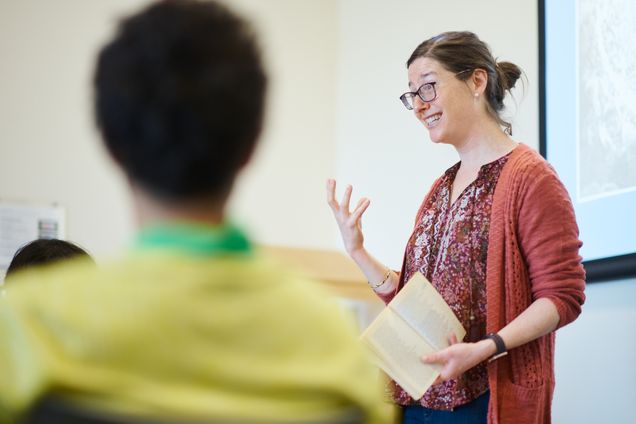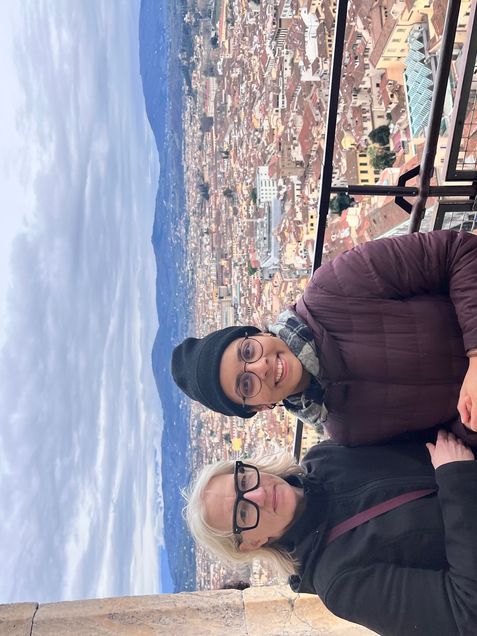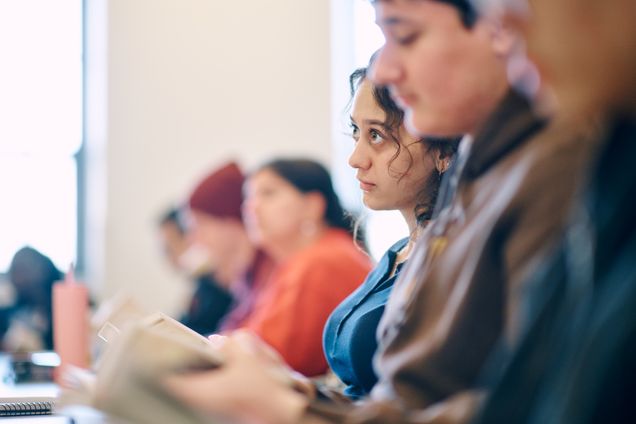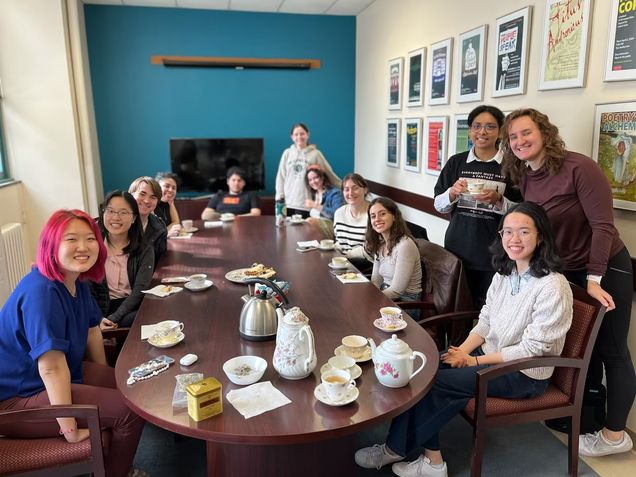The Humanity Lab
For 35 years, BU’s Core Program has taught some of history’s most consequential thinkers and their writings. More importantly, it facilitates a conversation about how to live well.ex
For 35 years, BU’s Core Program has taught some of history’s most consequential thinkers and their writings. More importantly, it facilitates a conversation about how to live well.ex
For Sophie Klein, a recent discussion in her section of “The Way: Antiquity and the Medieval World” (CC 102) exemplifies the relevance of CAS’s Core Curriculum to life today. Klein’s class had been reading Aristotle’s Nicomachean Ethics, in which the philosopher unpacks the concept of eudaimonia, which loosely translates to “thriving” or “living well.”
“We’re trying to figure out what this idea of ‘thriving’ means, and what it is that humans ideally and actually do,” says Klein, a senior lecturer in the Core Curriculum who also teaches in the department of classical studies. “What are we supposed to be doing, so that we can know if we’re thriving when we’re doing it?”
The class conversation took a turn in a direction Klein wasn’t expecting: to artificial intelligence. How does AI enhance, or diminish, human wisdom and thriving? ChatGPT might provide a shortcut in completing an academic paper, but at what cost? Aristotle, the class concluded, would say there’s value in the struggle to complete a task, and even in failure.
“[Relying on ChatGPT] would optimize your time, it would optimize your efficiency, it would maybe even write better than you could,” Klein says. “But you’re not developing that resilience—that ability to develop and hone a skill set through intention, effort, and practice—which is what Aristotle spells out for us.”

This is the kind of wisdom students mine every day from the Core Curriculum, a carefully curated sequence of liberal arts courses in the humanities, social sciences, and natural sciences that BU students can opt into to help them think critically and meaningfully about the world. Students can earn a Core minor by completing the two gateway humanities courses (CC 101 and 102) and at least four of the other humanities, social sciences, and natural sciences courses. Students who maintain a B+ average in their Core courses and complete a substantial capstone project or paper can graduate with Core honors.
AI may not have been an existential reality when the program began in 1989, but Core faculty say the readings—whether Virgil or the Gospel writers or Frederick Douglass—offer students relevant insights to every generation. In its 35 years, Core has matured into a sought-after community of learners from across the University, many of whom are seeking wisdom for today from history’s great minds.
“I think it’s a really special thing to get to sit down with a group of students, many of whom are first year, and spend time thinking about these eternal questions and listening to one another and getting a chance to have that community of people you’re going on this journey with,” Klein says. “It’s very energizing.”

In circulating proposed plans for a Core program, a 1988 memo to CAS faculty described “an integrated curriculum with a sustained exposure to great works of literature, philosophy, religion, and the arts” that “continue to speak to us today.” The optional Core Curriculum would consist of up to six courses (and a handful of electives) covering the philosophical and natural arc of history, from the Earth’s origins through modernity.
Students’ guides for the epic journey range from Homer to W.E.B. DuBois, with an objective of building a “community of readers, thinkers, and creators” who are ready to “meet the challenge of our present moment.” BU offers two first-year Core courses in the natural sciences: “Origins: The Cosmos, Earth, Life, and Human Beginnings” (CC 111) and “Science, Reality, and the Modern World” (CC 212), followed by two social sciences courses in year two. Core has not changed much since its advent 35 years ago, according to program director Kyna Hamill. But its popularity has grown since 1989, from roughly 150 students to 250 today. Hamill, a master lecturer, says around one in five first-year students opts into the program today, coming from almost every major at CAS—and beyond.

“I just taught my class this morning, and they’re students from Questrom, COM, linguistics, English, data sciences,” she says. “There are very few classes at BU where you’re going to have that diverse population of fields and study that are all reading the same book. Because these books can be read from so many different points of view, each student is invited to read it from their particular interest.”
But Hamill says that where many students may be drawn to Core for the intellectual pursuit, they stay for the community. Students can choose to live in specialized Core housing, attend experiential learning trips to Florence or London, and use the Core office as a hangout between classes.
“A lot of the students say ‘this is where I found my people,’” Hamill says. “We have students sitting outside [in the Core office suite] that met in first-year classes, and now they’re juniors and seniors and are hanging out together all the time.”

Klein, who is in her sixth year at BU, teaches three humanities courses in the Core curriculum: “Ancient Worlds” (CC 101), “The Way” (CC 102), and a 300-level course in which students can reimagine a favorite Core reading in a new digital format. “The Ancient Worlds” course opens with The Epic of Gilgamesh, considered the oldest text in recorded literature, dating to as early as 2100 BCE.
“[Gilgamesh] is a hero who’s two-thirds god,” Klein says. “So, what does it mean to be two-thirds god and one-third human?”
From there, CC 101 students read Homer’s Odyssey, Thucydides’ Peloponnesian War, Sophocles’ Ajax, Euripedes Hecuba, and the Hebrew Bible.
“We’ve got sacred texts, we’ve got mythological texts, we’ve got dramas, we’ve got history,” Klein says. “I tell students you have to know what you’re signing up for: There’s going to be a lot of reading, but then again there’s going to be a lot of reading.”
Klein says that despite having read all of the texts many times, she gleans something new in every discussion she has in class. She recalls class during the COVID-19 pandemic that they met weekly at 8 a.m. on Zoom. Logging on from their homes as far away as Hong Kong, Germany, and Brazil, the students grappled with what the texts said about grief, love, and friendship—discussions that frequently turned to what students were living through at the time.

“That’s the takeaway of this class, isn’t it? The texts are beautiful and it’s lovely to read them and think about them, but they only continue to be meaningful if they give you a way of thinking about the present time,” Klein says. “There has to be a sense that we are reading these in order to have more perspective, to have clear eyes, to have a partner in meaning-making for what we are doing today.”
A former English major with a PhD in American poetry, Liz Jones-Dilworth (CAS’02) now owns a marketing and design firm, JDI, whose clients are mostly science companies. “One quick scan through our lengthy design portfolio would show you how art and science and writing come together in my world,” says Jones-Dilworth, who credits Core’s emphasis on both the humanities and natural sciences for giving her a fluency in both worlds.

 Top Photo: Liz Jones-Dilworth (right) met four of her best BU friends in the Core, including Bethany Gumper (CAS’02); Bottom Photo: Elizabeth Milnes (CAS’02), Liz Jones-Dilworth (CAS’02), Professor of Philosophy C. Allen Speight, David Gelles (CAS’02), Bethany Gumper (CAS’02), and Matthew Parker (CAS’02) at the Core banquet in May 2000 (r-to-l).
Top Photo: Liz Jones-Dilworth (right) met four of her best BU friends in the Core, including Bethany Gumper (CAS’02); Bottom Photo: Elizabeth Milnes (CAS’02), Liz Jones-Dilworth (CAS’02), Professor of Philosophy C. Allen Speight, David Gelles (CAS’02), Bethany Gumper (CAS’02), and Matthew Parker (CAS’02) at the Core banquet in May 2000 (r-to-l). Jones-Dilworth’s meaningful experiences in Core are almost too many to list: She met four of her best BU friends in CC 102; her sophomore year roommate was her CC 101 study partner; she worked in the Core office, was a Core writing tutor, and videotaped Core science lectures; and she edited the Journal of the Core Curriculum and served on the banquet committee.
So when she had an opportunity to give back as founder of the Core Alumni Council, she didn’t hesitate. The council works to connect current students, professors, and alumni. Recent and upcoming events include a gathering for students on entering the job market and a book club for Core alumni in March.
“The Core Alumni Council is manifesting the community that the alumni feel so strongly with each other,” Jones-Dilworth says. “To go through Core is a unique experience; anyone else who has chosen that path is automatically intriguing to me and I feel I have some kinship with them.”
Core was one of the main reasons Netiva Sinha (CAS’25) came to BU. Sinha, who is from Bangkok, Thailand, was looking for a university in the US where she could pursue STEM and the humanities in the same place. She was drawn to BU for the smaller Core class sizes and the opportunity to read and discuss texts she would have regretted missing. Initial uncertainty about her decision subsided as the neuroscience major connected with her Core colleagues in and outside of class, as well as in the Core office, where Sinha worked beginning in her second year.


 Netiva Sinha (CAS`25) with her Core friends on campus (middle), in Florence (top), and at a Core tea event (bottom). Courtesy of Netiva Sinha.
Netiva Sinha (CAS`25) with her Core friends on campus (middle), in Florence (top), and at a Core tea event (bottom). Courtesy of Netiva Sinha.Sinha, who says she’s “found her place at BU and within Core,” adds that she’s been drawn to the engagement with her classmates on the questions more than the answers. The engagement is all the richer because of the diverse array of students Core attracts.
“Everyone is taking their life experiences, what they’ve taken from the class, other classes, other topics, their own personal interests, and they’re bringing that to class,” Sinha says. “The discussion is the most valuable thing you can get from the class. It’s not about the answer, it’s about the fact that people are contributing everything they’ve learned, everything that makes them human, into that discussion.”
Four years on, Sinha has picked up a Core minor and says she is convinced “science is just another field we use to understand ourselves as humans.” She says she is applying to teaching master’s programs with the hopes of becoming a high school biology teacher.
“Having this interdisciplinary, holistic approach to science from Core, I feel like I’ll be able to translate that into the classroom,” Sinha says.
Term I
CAS CC 101 Core Humanities I: Ancient Worlds (4 units)
CAS CC 111 Core Natural Sciences I: Origins: The Cosmos, Earth, Life, and Human Beginnings (4 units)
Term II
CAS CC 102 Core Humanities II: The Way: Antiquity and the Medieval World (4 units)
CAS CC 212 Core Natural Sciences II: Science, Reality, and the Modern World (4 units)
Term I
CAS CC 201 Core Humanities III: Renaissance, Rediscovery, and Reformation (4 units)
CAS CC 221 Core Social Sciences I: Making the Modern World: Progress, Politics, and Economics (4 units)
Term II
CAS CC 202 Core Humanities IV: Enlightenment, Romanticism, and Modernity (4 units)
CAS CC 222 Core Social Sciences II: Unmaking the Modern World: The Psychology, Politics, and Economics of the Self (4 units)
Students pursuing a Minor in Core Independent Studies to build on the academic program will also complete the 2-unit capstone course, normally in the third year of study:
CAS CC 350 Core Capstone (2 units)
CAS CC 220 Multimedia Encounters with Core Texts (2 units)
CAS CC 318 Public Speaking (4 units)
CAS CC 320 Multimedia Encounters with Core Texts (4 units)
HUB CC 182 Cocurricular: The Core Docent Program II (2 units)
HUB CC 192 Cocurricular: Collegiate Publishing Workshop: The Journal of the Core Curriculum (2 units)